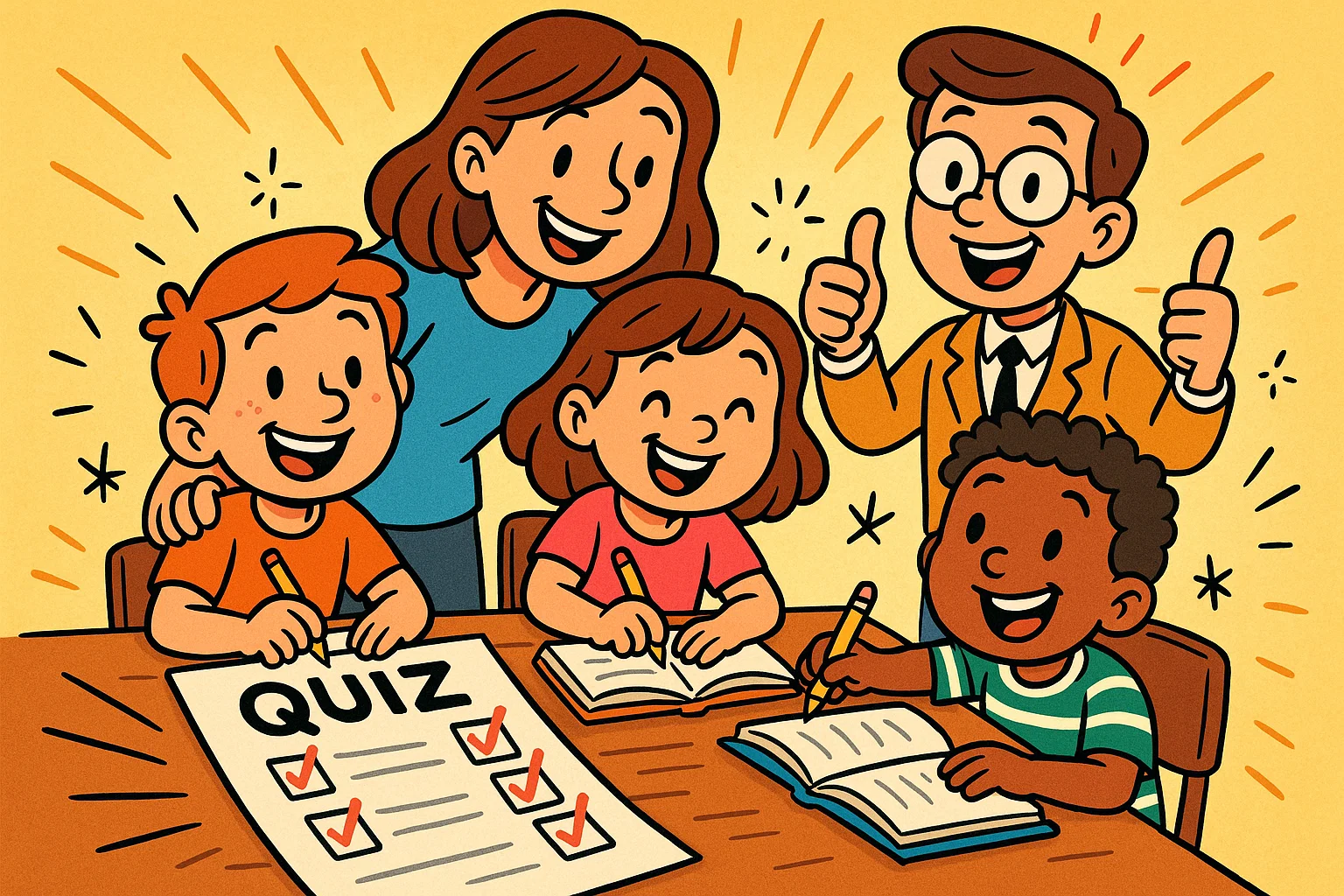Children between eight and ten years old actively expand general knowledge, improve logical thinking, and develop sustained attention. Well-designed quizzes for 8–10 year olds support these processes through structured questions, age-appropriate difficulty, and clear answers. Compared with passive activities, quiz questions for kids encourage active recall, reasoning, and discussion.
A balanced mix of trivia questions for kids 8–10, general knowledge quizzes, and subject-based challenges helps maintain interest while reinforcing school skills. Quizzes for 8–10 year olds with answers also allow parents and educators to guide learning without turning activities into formal testing. This format combines entertainment with measurable educational value, making it suitable for home, classroom, and group settings.
Why quizzes are good for kids aged 8–10
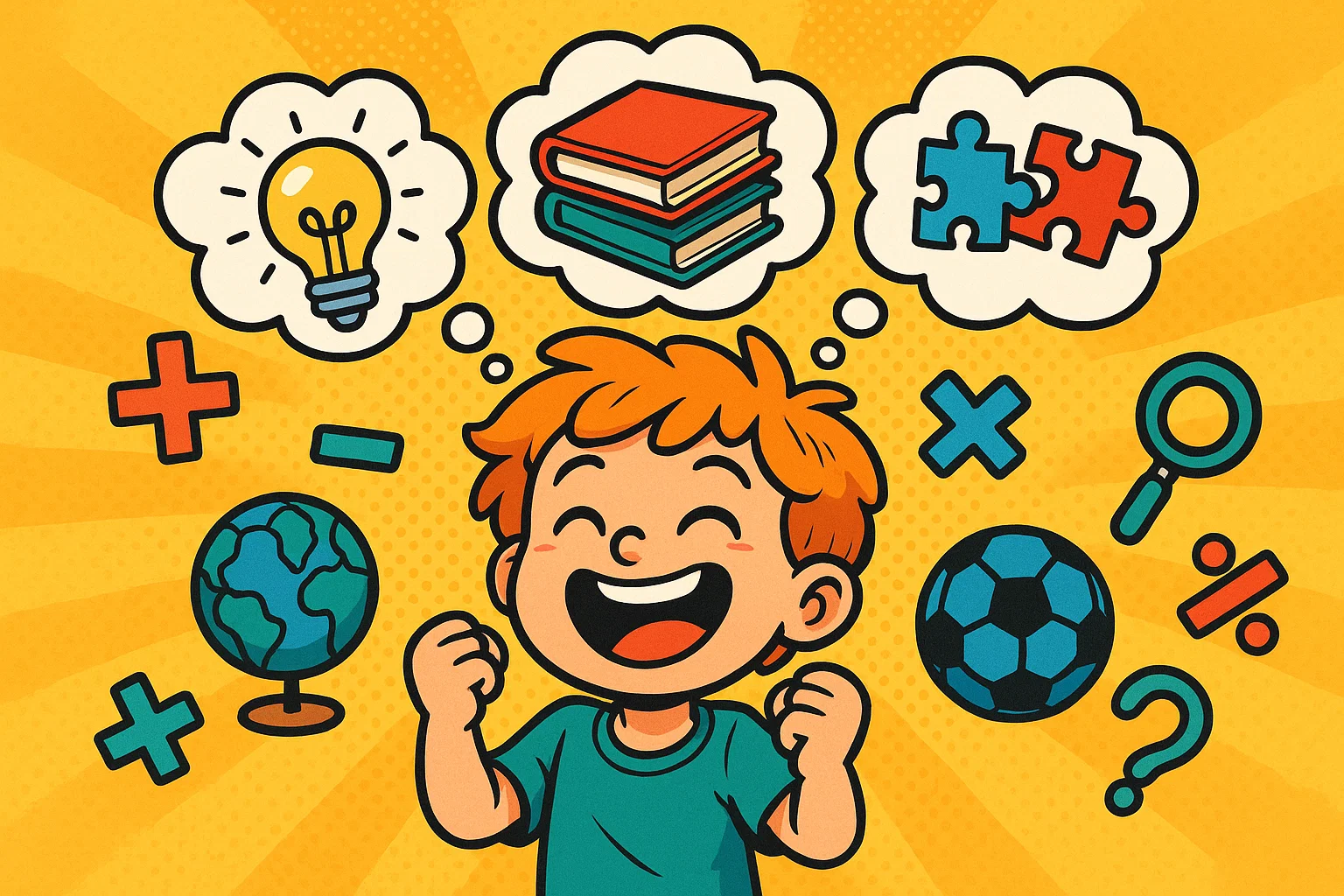
At this age, children are moving from concrete thinking to more abstract thought. Quizzes provide a playful and low-pressure environment to exercise these new cognitive skills. They can transform learning from a chore into a rewarding game, making it a great way to reinforce classroom lessons and introduce new topics.
Improves memory and problem-solving
A quiz is essentially a memory exercise disguised as a game. When children recall facts, they are strengthening their neural pathways, which helps with long-term memory retention. Think of it like a mental workout. For example, a child might remember that the “Red Planet” is Mars after seeing it in a quiz, making that fact stick much better than if they just read it in a book. According to the study Karpicke & Blunt in Science, active recall (retrieval practice) leads to stronger long-term retention than elaborative methods like concept mapping. When kids take a quiz and recall information, they actively participate in this powerful learning process. This practice also hones their problem-solving skills, as they learn to sift through information and apply logic to find the correct answer.
Encourages curiosity and learning
A fun trivia question about the human body or a faraway continent can spark a child’s interest in a way a textbook might not. For example, a simple question like, “Which planet is the largest in our solar system?” can lead to a fascinating conversation about space, planets, and the universe. These questions can be used as a springboard for further exploration. As Dr. Maria Montessori once said,
“The greatest sign of success for a teacher is to be able to say, ‘The children are now working as if I did not exist.’”
Quizzes give kids the agency to drive their own learning, as they may become so intrigued by a topic that they go and research it on their own, a sure sign of intrinsic motivation.
Fun activity for families and classrooms
Quizzes provide a wonderful opportunity for bonding. Parents, siblings, and children can all participate, creating shared memories and a spirit of cooperation. In a classroom setting, a quick quiz can break up the monotony of a lecture, serve as a quick assessment, or act as a team-building exercise. It’s a great way to keep children entertained and engaged, whether on a long car ride or a cozy evening at home. One educator noted that using a quiz at the start of a solar system lesson excites the students and lets him gauge what they know without a formal test. It’s a win-win.
Things to consider before starting quizzes
Before diving into the questions, a little preparation can go a long way in ensuring the activity is a success. The goal is to make it fun and educational, not a stressful test.
Choosing the right difficulty
You want to strike a balance. Questions that are too easy might not be challenging enough to hold their interest, while questions that are too hard can be discouraging. A good rule of thumb is to mix in some confidence-boosting easy quiz questions with a few that require a bit of thought. This keeps the kids entertained and engaged. For example, you might start with a simple question like, “What is the largest land animal?” before moving on to a slightly trickier one.
Mixing subjects and themes
Variety is key to keeping young minds captivated. Include a wide range of topics like science and history, as well as general knowledge, pop culture, and animal facts. This approach caters to different interests and helps children discover new passions. A quiz that covers a diverse array of subjects is a fantastic way to test their knowledge across different domains.
Making quizzes interactive
Don’t just read questions from a list. Get creative! You can:
- Use true or false questions to get quick answers.
- Incorporate a multiple-choice format to provide clues.
- Add riddles or brain teasers for a different type of challenge.
- Use pictures or diagrams to make the quiz more visually stimulating.
Easy quizzes for 8–10 year olds with answers
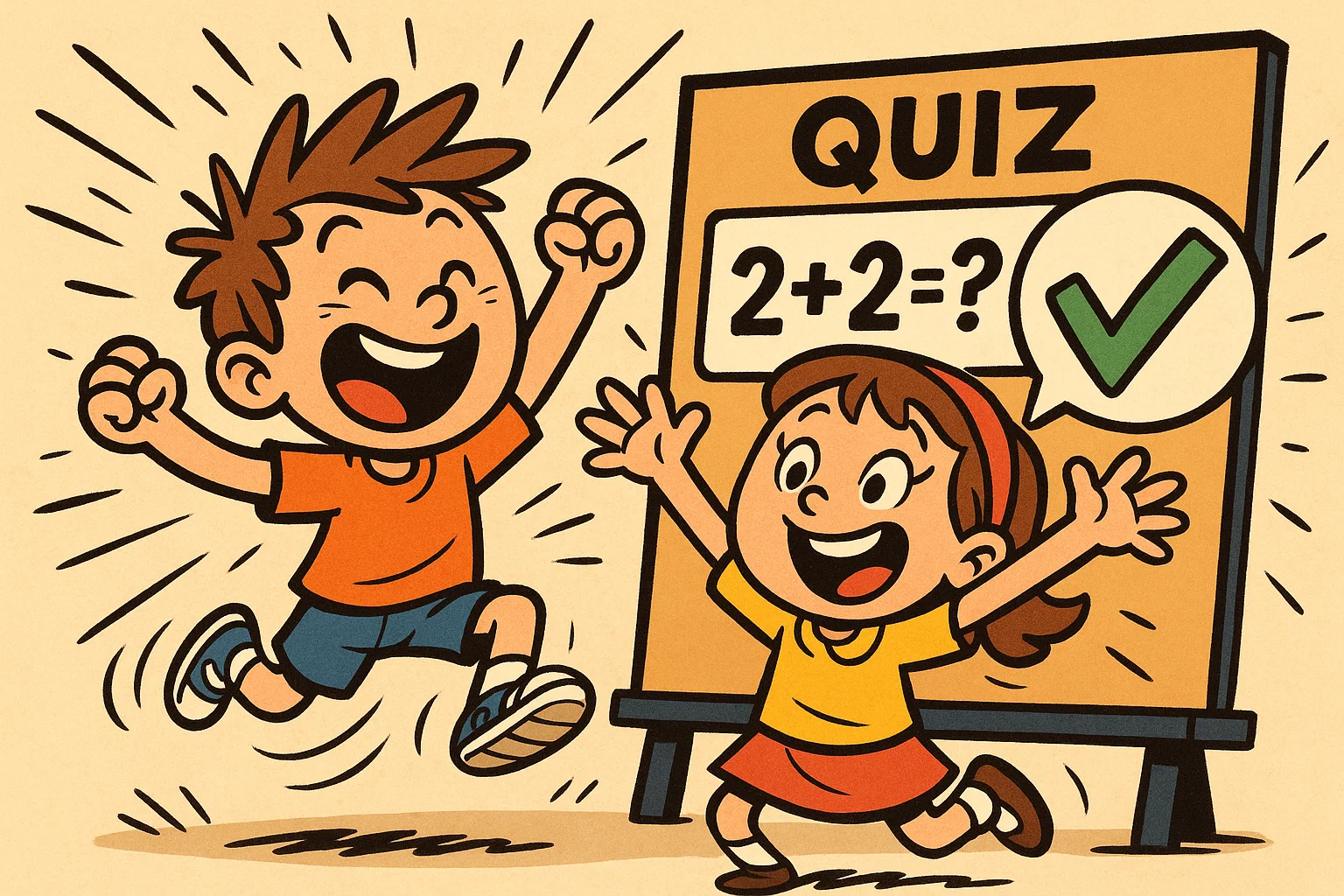
This set of questions is perfect for little ones just starting out, or for building confidence at the beginning of a quiz.
General knowledge questions
- What is the capital of Japan? Tokyo
- What do you call the main body of a tree? The trunk
- Which animal is the tallest in the world? Giraffe
- What is the largest organ in the human body? The skin
- How many days are in a leap year? 366
Animal questions
- Which animal is known as the “King of the Jungle”? Lion
- What is a group of lions called? A pride
- Which animal has a very long trunk? Elephant
- How many legs does a spider have? Eight
- What is a baby goat called? A kid
Math questions
- What is 25 + 10? 35
- What is 8 x 5? 40
- If you have 12 apples and you eat 5, how many are left? 7
- How many minutes are in one hour? 60
- What is 50 divided by 10? 5
Medium quizzes for 8–10 year olds with answers
These questions are a step up and are great for kids who have a solid base of general knowledge.
Science questions
- What planet is known as the Red Planet? Mars
- What gas do plants breathe in? Carbon dioxide
- What are the three states of matter? Solid, liquid, and gas
- Which human body part pumps blood? The heart
- What force keeps us on the ground? Gravity
History questions
- Who was the first president of the United States? George Washington
- What was the name of the ship the Pilgrims sailed on to America? The Mayflower
- Which ancient civilization built the pyramids? The Ancient Egyptians
- Who invented the light bulb? Thomas Edison
- When did the dinosaurs live? The Mesozoic Era
Sports and games questions
- How many players are on a soccer team? 11
- What is a perfect score in ten-pin bowling? 300
- What sport uses a shuttlecock? Badminton
- What is the highest-scoring piece in chess? The Queen
- What is the color of the Olympic rings? Blue, yellow, black, green, and red
Hard quizzes for 8–10 year olds with answers
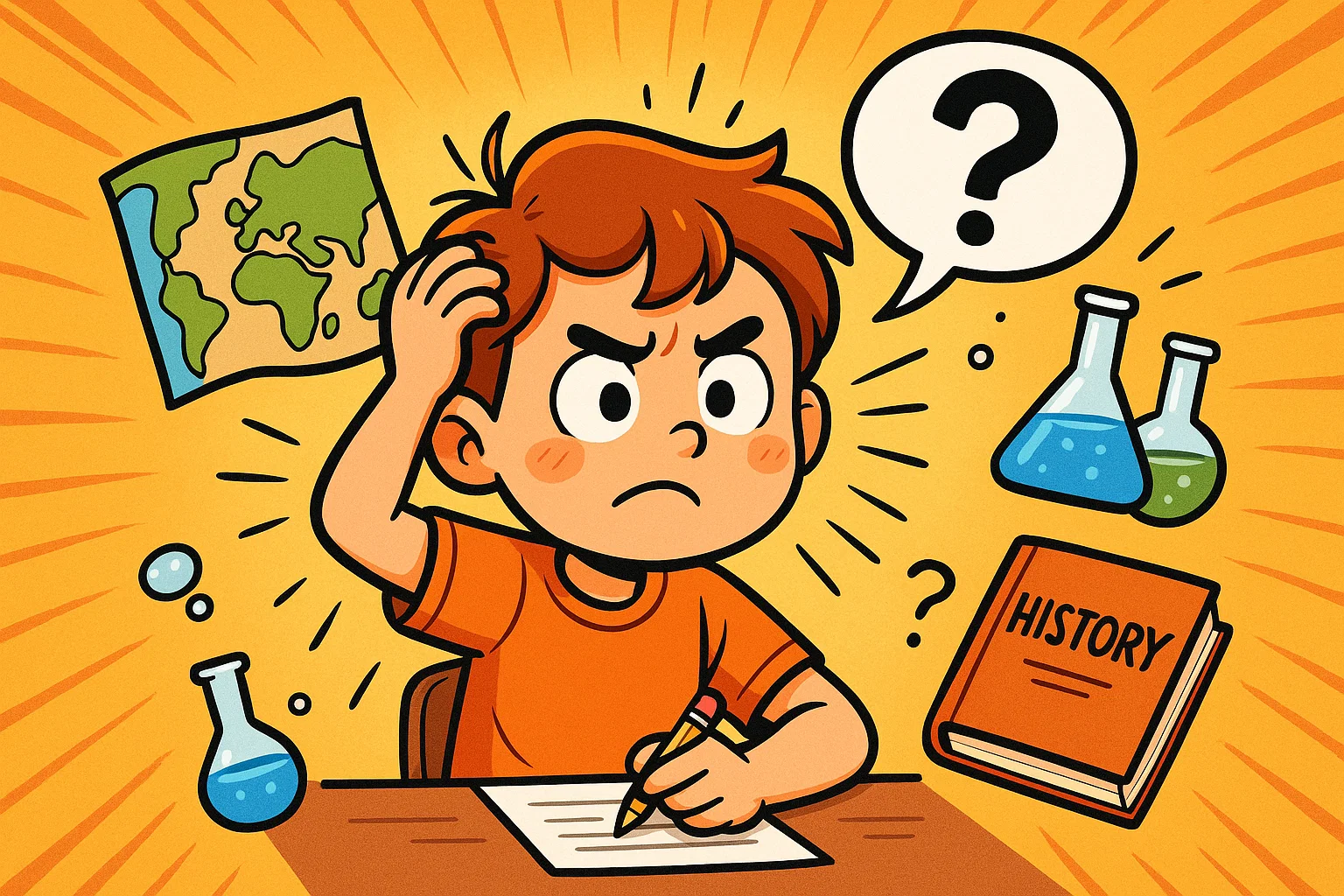
For the kids who love a challenge, these questions are designed to make them think a little harder.
Geography questions
- What is the longest river in the world? The Nile River
- What is the largest continent? Asia
- How many continents are there? Seven
- What is the most populous country in the world? India
- Which country is shaped like a boot? Italy
Literature and movies questions
- Who wrote the Harry Potter series? J.K. Rowling
- In The Lion King, what is the name of Simba’s father? Mufasa
- What is the name of the magical nanny in the book by P.L. Travers? Mary Poppins
- In the movie Finding Nemo, what is Nemo’s dad’s name? Marlin
- Who is the main character in the book Matilda? Matilda Wormwood
Brain-teaser questions
- What has to be broken before you can use it? An egg
- What has a neck but no head? A bottle
- What goes up and never comes down? Your age
- I have cities, but no houses. I have mountains, but no trees. I have water, but no fish. What am I? A map
- What is full of holes but still holds water? A sponge
Themed quizzes for kids 8–10 with answers
These curated sets of questions allow kids to delve into their favorite topics.
Disney quiz
- Question: What is the name of the snowman in Frozen? Olaf
- Question: In Moana, who is the demigod with the magical hook? Maui
- Question: What animal sidekick does Mulan have? A dragon named Mushu
Animal quiz
- Question: Which ocean animal has three hearts? An octopus
- Question: What is a baby kangaroo called? A joey
- Question: Which animal can change its color to match its surroundings? A chameleon
Sports quiz
- Question: What is a home run in baseball? A hit that allows the batter to run all the way around the bases
- Question: What sport is played at Wimbledon? Tennis
- Question: What are the five rings on the Olympic flag? A symbol of the five continents of the world
Holiday quiz
- Question: What holiday tradition involves a large turkey? Thanksgiving
- Question: What do children often go door-to-door for on Halloween? Trick-or-treating
- Question: On Christmas, what holiday character comes down the chimney? Santa Claus
Pop culture quiz
- Question: Who is the main vocalist of BTS? Jungkook is the main vocalist, while RM is the group’s leader.
- Question: In the video game Minecraft, what is the main character’s name? Steve
- Question: What is the most popular video game in the world? While difficult to measure, Minecraft is often cited as the best-selling game of all time.
Fun riddles and puzzles with answers
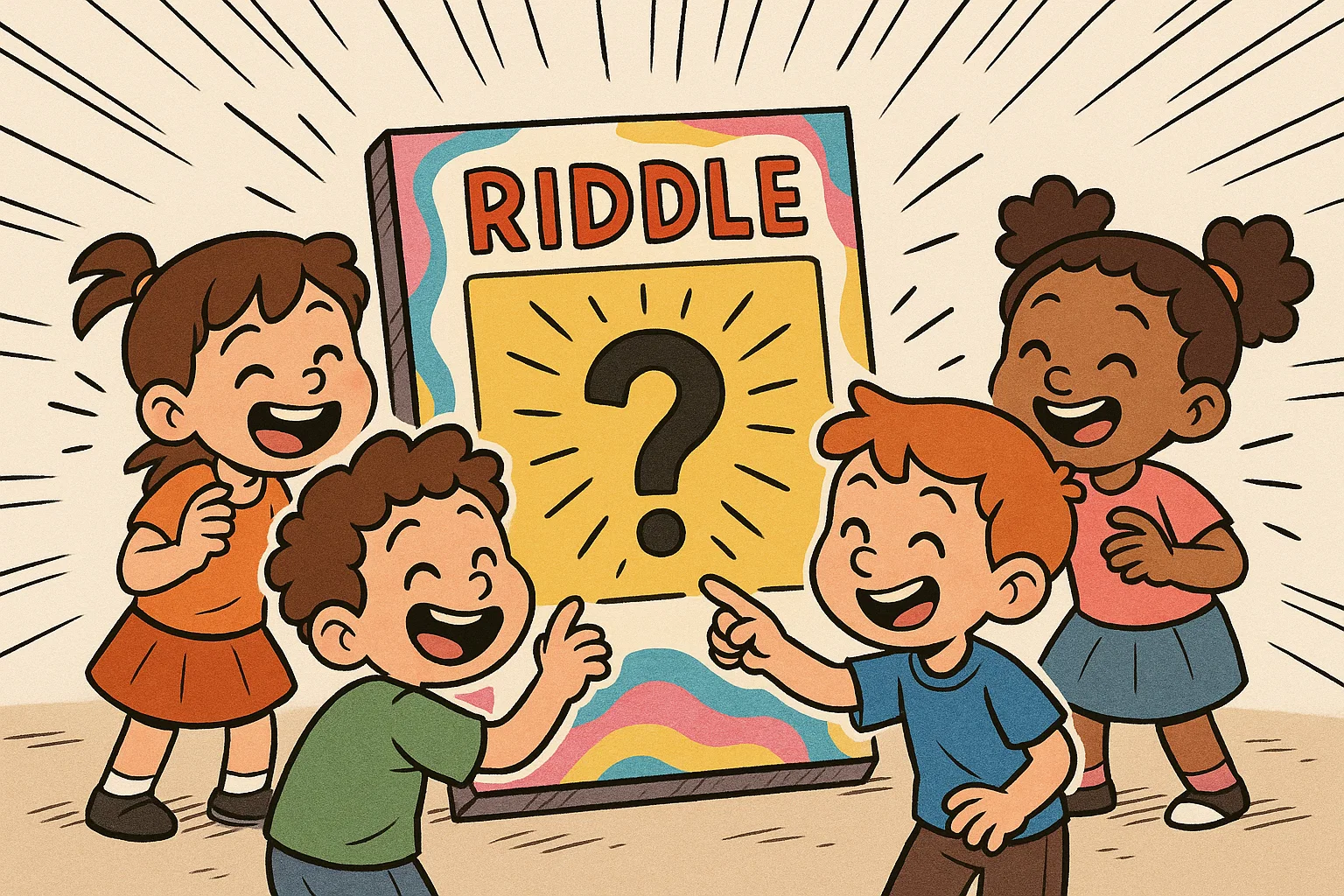
Riddles are a fantastic way to develop logical thinking and problem-solving skills in a more creative format.
Short riddles
- Question: I am an odd number. Take away one letter and I become even. What number am I? Seven
- Question: What belongs to you, but other people use it more than you do? Your name
Story riddles
- Question: A bus driver was heading to the city. He saw a school bus on the highway with no one in it. The school bus was driving itself. How is that possible? The bus driver was driving the bus, so there was no one in it.
Math riddles
- Question: I am a three-digit number. My first digit is the number of sides on a triangle. My second digit is the number of wheels on a unicycle. My third digit is the number of sides on a square. What number am I? 314
Family and classroom quiz ideas
Quizzes aren’t just for one-off fun; they can be integrated into regular routines to become a part of the learning process.
Quiz night at home
- Organize into teams: Parents vs. kids, or siblings vs. siblings.
- Use a timer: Add a bit of friendly pressure.
- Create a scoreboard: Track points and award a small prize to the winning team.
School quiz competition
- Review for tests: Teachers can use a quiz as a fun, quick review session before an exam.
- End-of-day activity: A short trivia session can be a fun way to wind down the day and check for comprehension.
Travel quizzes
- Keep kids entertained: A quiz is a great way to pass the time on long car or plane trips.
- Geography challenges: Ask questions about the places you’re passing through or traveling to.
More quizzes and learning activities
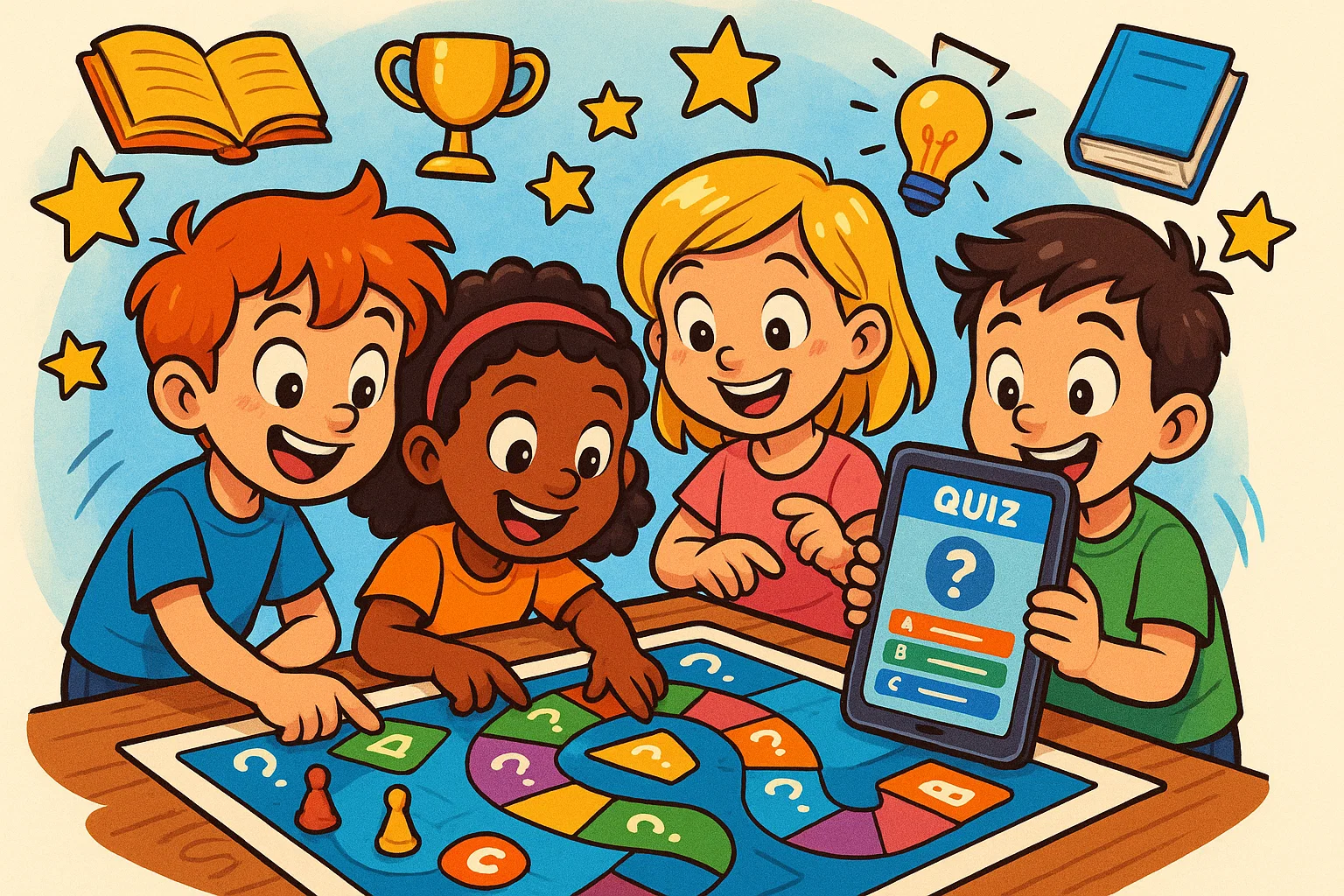
If your kids love quizzes, there are plenty of other ways to keep their minds active and engaged.
Science experiments for kids
- Kitchen science: Try easy experiments like making a volcano with baking soda and vinegar.
- Nature scavenger hunts: Combine outdoor exploration with science facts.
Educational apps and games
- Look for apps: Many educational apps offer quiz-style formats for learning.
- Online resources: Websites like NASA Kids and National Geographic Kids are full of amazing facts and games.
Printable worksheets
- Downloadable trivia: Many websites offer free printable worksheets with a variety of questions. This can be a great way to offer a screen-free learning experience.
FAQs about quizzes for 8–10 year olds
Here are some common questions parents and teachers ask about quizzes for this age group.


